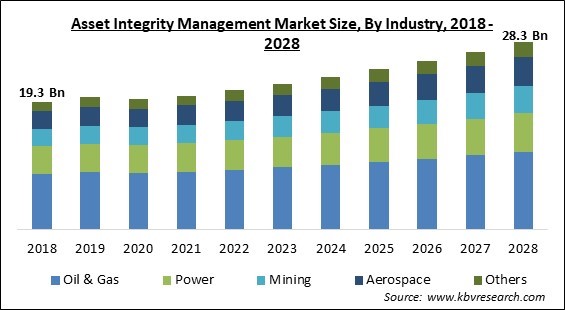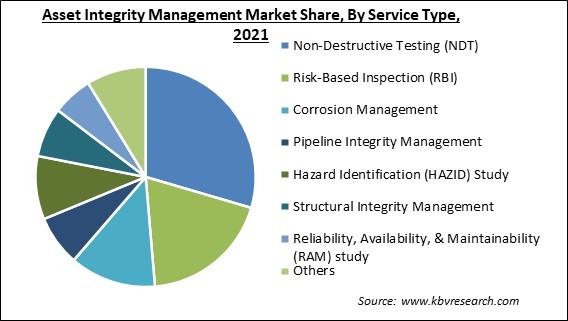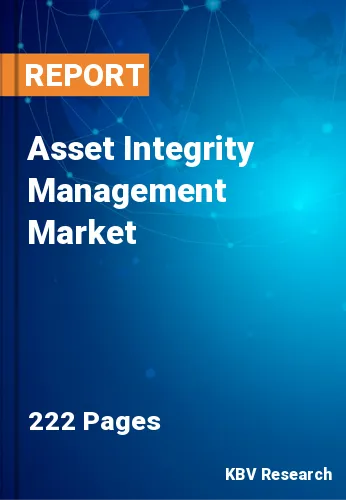The Global Asset Integrity Management Market size is expected to reach $28.3 billion by 2028, rising at a market growth of 5.1% CAGR during the forecast period.
Asset integrity management is the process of overseeing an asset (such as a power plant, oil rig, refinery, etc.) to make sure that it maintains the ability to fulfill its function successfully and efficiently (AIM). Effective AIM plans ensure that, while adhering to environmental and health requirements, the people, processes, systems, and resources required for an asset to fulfill its function are available at all times.

AIM applies to the decommissioning, design, and replacement phases of an asset's operation. The primary industry sector that AIM supports is upstream oil and gas. This is a result of the growth in oil and gas industry investment in this area brought on by the rising energy demand, which has increased the operational service life of existing rigs. However, any high-value asset, such as oil refineries, energy-producing facilities, and chemical processing facilities, can be implemented using the AIM technique.
Asset integrity management (AIM) is the term used to describe the software and services used in systematic and coordinated operations to guarantee the availability of vital assets and systems while preserving safety, health, and the environment. Asset integrity management assists in ensuring that the individuals, organizations, procedures, and tools that deliver integrity are available, operational, and capable of performing as needed.
The importance of asset integrity in guaranteeing safety has caused many facilities that run risky processes to start paying more attention to it. A variety of industries are developing best practices for safety. In addition, several standard groups are developing standards to give end users a clearer understanding of what safety means. Investment is being driven by end-users in the oil & gas, refining, petrochemical, and mining industries due to compliance with increasingly strict safety and environmental laws.
The COVID-19 pandemic has drastically decreased the industrial sector's need for power. In response to the virus pandemic, governments all around the world were forced to curtail corporate operations. Plant-wide asset inspection and repair work has been put on hold, with a focus only on high-priority assets connected to production. There is a rising backlog of inspection and maintenance work as a result of the current COVID-19 mitigation approach, which involves working from home and social isolation.
The oil and gas and power sectors' daily operations are significantly impacted by climatic variations throughout time. The necessity of preparing for climate adaptation and its integration into the overall risk management plan is being increasingly recognized by a variety of industries and governments. To prevent significant setbacks or dangerous mishaps, climatic fluctuations must be considered when risk management is being done.
Large-scale infrastructure development is taking place in developing nations like China, India, and Mexico, particularly in the field of power generation. The majority of this expansion is concentrated in areas where the demand is being driven by rapid economic growth, particularly in Asia. Data from the World Nuclear Association (as of September 2020) show that Asia's capacity for energy generation, specifically nuclear power generation, is expanding significantly.
Asset integrity management uses a variety of tools, including hardware and software, that must be controlled and managed by experts. For running software and equipment used to perform the asset integrity examination, a team with specialized training and education is needed. For these tasks, workers need to be specially trained, and they also need a lot of relevant expertise. They have the skills to operate the plants and make the proper decisions at the right moment with the help of their experience and training.

On the basis of Service Type, the Asset Integrity Management Market is divided into Non-Destructive Testing (NDT), Risk-Based Inspection (RBI), Corrosion Management, Pipeline Integrity Management, Hazard Identification (HAZID) Study, Structural Integrity Management, Reliability, Availability, And Maintainability (RAM) study, and Others. The Risk-Based Inspection (RBI) segment witnessed a significant revenue share in the assist integrity management market in 2021. The process of creating an inspection plan based on an understanding of the risk of failure is known as risk-based inspection. A risk analysis is a crucial step.
Based on the Industry, the Asset Integrity Management Market is segmented into Oil & gas, Power, Mining, Aerospace, and Others. The oil & gas segment procured the largest revenue share in the assist integrity management market in 2021. The asset integrity management market is anticipated to benefit from the oil and gas sector's expanding size. Asset integrity management systems might be widely employed in the industry to monitor maintenance procedures and streamline inspection processes.
| Report Attribute | Details |
|---|---|
| Market size value in 2021 | USD 20.3 Billion |
| Market size forecast in 2028 | USD 28.3 Billion |
| Base Year | 2021 |
| Historical Period | 2018 to 2020 |
| Forecast Period | 2022 to 2028 |
| Revenue Growth Rate | CAGR of 5.1% from 2022 to 2028 |
| Number of Pages | 222 |
| Number of Tables | 329 |
| Report coverage | Market Trends, Revenue Estimation and Forecast, Segmentation Analysis, Regional and Country Breakdown, Companies Strategic Developments, Company Profiling |
| Segments covered | Service Type, Industry, Region |
| Country scope | US, Canada, Mexico, Germany, UK, France, Russia, Spain, Italy, China, Japan, India, South Korea, Singapore, Malaysia, Brazil, Argentina, UAE, Saudi Arabia, South Africa, Nigeria |
| Growth Drivers |
|
| Restraints |
|
Region-wise, the Asset Integrity Management Market is analyzed across North America, Europe, Asia Pacific, and LAMEA. The Asia pacific region acquired a promising revenue share in the assist integrity management market in 2021. The market is expanding primarily as a result of rising oil and gas demand as well as an increase in merger and acquisition activity, which has led to higher investments in the local energy sector. The asset integrity management market in the Asia Pacific is growing as a result of developments in economic development, infrastructure building, and the development of power plants.
Free Valuable Insights: Global Asset Integrity Management Market size to reach USD 28.3 Billion by 2028
The market research report covers the analysis of key stake holders of the market. Key companies profiled in the report include Bureau Veritas S.A., SGS S.A., Intertek Group PLC, TechnipFMC plc, Applus+ Group, Aker Solutions ASA, ROSEN Swiss AG, LifeTech Engineering Ltd., EM&I Group, and Metegrity, Inc.
By Industry
By Service Type
By Geography
The Asset Integrity Management Market size is projected to reach USD 28.3 billion by 2028.
Operations In Various Industries Are Disrupted By Climate Changes are driving the market in coming years, however, Insufficient Individuals With The Necessary Skills To Operate Asset Integrity Management Systems And Software restraints the growth of the market.
Bureau Veritas S.A., SGS S.A., Intertek Group PLC, TechnipFMC plc, Applus+ Group, Aker Solutions ASA, ROSEN Swiss AG, LifeTech Engineering Ltd., EM&I Group, and Metegrity, Inc.
The expected CAGR of the Asset Integrity Management Market is 5.1% from 2022 to 2028.
The Non-Destructive Testing (NDT) segment acquired maximum revenue share in the Global Asset Integrity Management Market by Service Type in 2021 thereby, achieving a market value of $7.5 billion by 2028.
The North America market dominated the Global Asset Integrity Management Market by Region in 2021, and would continue to be a dominant market till 2028; thereby, achieving a market value of $10.4 billion by 2028.
Our team of dedicated experts can provide you with attractive expansion opportunities for your business.

